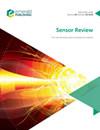Excellent acetone sensing performance of Au NPs functionalized Co3O4-ZnO nanocomposite
IF 1.4
4区 工程技术
Q3 INSTRUMENTS & INSTRUMENTATION
引用次数: 1
Abstract
Purpose This paper aims to successfully synthesize three-dimensional spindle-like Au functionalized Co3O4-ZnO nanocomposites; characterize the structure, morphology and surface chemical properties of the products; study the effect of Au NPs doping concentration, operating temperature different gas to, sensing properties; and introduce an attractive gas sensor for acetone detection. Design/methodology/approach Au NPs functionalized Co3O4-ZnO nanocomposite was prepared by coprecipitation and impregnation methods; the structure and surface chemical property of the products were characterized by XRD, SEM, TEM, UV-Vis, BET and XPS. The sensing ability of Au@Co3O4-ZnO for acetone and mechanism was analyzed systematically. Findings The results of gas sensing tests show that the unique component structure, Schottky junction and catalytic effect of Au functionalization make it have low operating temperature, excellent selectivity, high response (10 ppm, 56) and rapid response recovery time. Research limitations/implications All the characterization and test data of the prepared materials are provided in this paper and reveals the gas sensing mechanism of the gas sensor. Practical implications The detection limit is 2.92–100 ppb acetone. It is promising to be applied in low-power, micro detection and miniature acetone gas sensors. Social implications The gas sensor prepared has a lower working temperature and low detection limit, so it has promising application prospects in low-concentration acetone detection and early warning. Originality/value The unique component structure, Schottky junction and catalytic effect of Au functionalization Co3O4-ZnO make it have low operating temperature, excellent selectivity and rapid response recovery time.Au NPs功能化Co3O4-ZnO纳米复合材料具有优异的丙酮传感性能
目的成功合成三维纺锤状Au功能化Co3O4-ZnO纳米复合材料;表征产品的结构、形态和表面化学性质;研究了Au NPs掺杂浓度、不同气体工作温度对传感性能的影响;并介绍了一种具有吸引力的丙酮检测气体传感器。采用共沉淀法和浸渍法制备了NPs功能化的Co3O4-ZnO纳米复合材料;采用XRD、SEM、TEM、UV-Vis、BET、XPS等表征了产物的结构和表面化学性质。系统分析了Au@Co3O4-ZnO对丙酮的传感能力及机理。气敏实验结果表明,独特的组分结构、肖特基结和Au功能化的催化作用使其具有工作温度低、选择性好、响应高(10 ppm, 56)、响应恢复时间快等特点。研究局限性/意义本文提供了所制备材料的所有表征和测试数据,并揭示了该气体传感器的气敏机理。实际意义丙酮的检出限为2.92-100 ppb。在低功耗、微检测和微型丙酮气体传感器中具有广阔的应用前景。社会意义制备的气体传感器工作温度低,检测限低,在低浓度丙酮检测和预警方面具有广阔的应用前景。Au功能化Co3O4-ZnO独特的组分结构、肖特基结和催化作用使其具有较低的工作温度、优异的选择性和快速的响应恢复时间。
本文章由计算机程序翻译,如有差异,请以英文原文为准。
求助全文
约1分钟内获得全文
求助全文
来源期刊

Sensor Review
工程技术-仪器仪表
CiteScore
3.40
自引率
6.20%
发文量
50
审稿时长
3.7 months
期刊介绍:
Sensor Review publishes peer reviewed state-of-the-art articles and specially commissioned technology reviews. Each issue of this multidisciplinary journal includes high quality original content covering all aspects of sensors and their applications, and reflecting the most interesting and strategically important research and development activities from around the world. Because of this, readers can stay at the very forefront of high technology sensor developments.
Emphasis is placed on detailed independent regular and review articles identifying the full range of sensors currently available for specific applications, as well as highlighting those areas of technology showing great potential for the future. The journal encourages authors to consider the practical and social implications of their articles.
All articles undergo a rigorous double-blind peer review process which involves an initial assessment of suitability of an article for the journal followed by sending it to, at least two reviewers in the field if deemed suitable.
Sensor Review’s coverage includes, but is not restricted to:
Mechanical sensors – position, displacement, proximity, velocity, acceleration, vibration, force, torque, pressure, and flow sensors
Electric and magnetic sensors – resistance, inductive, capacitive, piezoelectric, eddy-current, electromagnetic, photoelectric, and thermoelectric sensors
Temperature sensors, infrared sensors, humidity sensors
Optical, electro-optical and fibre-optic sensors and systems, photonic sensors
Biosensors, wearable and implantable sensors and systems, immunosensors
Gas and chemical sensors and systems, polymer sensors
Acoustic and ultrasonic sensors
Haptic sensors and devices
Smart and intelligent sensors and systems
Nanosensors, NEMS, MEMS, and BioMEMS
Quantum sensors
Sensor systems: sensor data fusion, signals, processing and interfacing, signal conditioning.
 求助内容:
求助内容: 应助结果提醒方式:
应助结果提醒方式:


